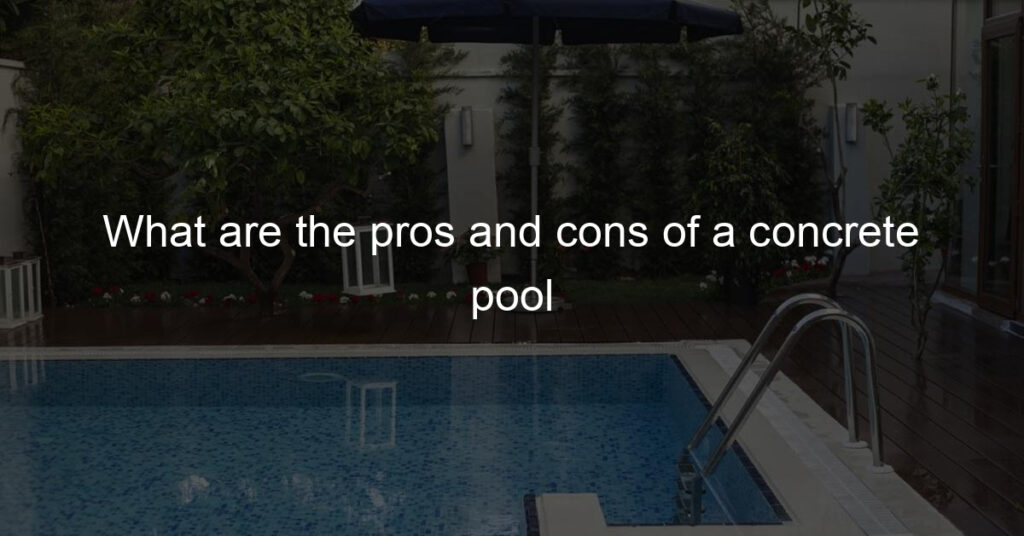What Are The Pros And Cons Of A Concrete Pool
If you’re thinking about installing a swimming pool in your backyard, you’ve probably come across various options – concrete, fiberglass, and vinyl liner pools, to name a few.
Each comes with its unique set of benefits and drawbacks. Among these, concrete pools stand out for their durability and design flexibility. However, they also require a considerable investment of time, money, and maintenance.
In this comprehensive guide, we dive into the nitty-gritty of concrete pools – exploring their pros and cons, how they stack up against other types of pools, and key considerations to keep in mind.
Whether you’re a seasoned homeowner looking to spruce up your property or a newbie planning your dream backyard, this guide is designed to help you make an informed decision about installing a concrete pool. Simple, straightforward, and packed with useful information – let’s dive in!
Understanding Concrete Pools: An Overview
Concrete pools, also known as gunite or shotcrete pools, are custom-built in-ground pools that offer a wide range of options when it comes to their shape, size, and design. These pools are made by spraying a mix of concrete and sand onto a metal-reinforced framework.
After the concrete sets and dries, it’s either painted, finished with a smooth plaster layer, or covered with tile or stone. Concrete pools are often associated with their durability and the creative freedom they provide, but there are also some potential downsides to consider, including longer installation times and higher maintenance needs.
The Longevity of Concrete Pools: A Major Advantage
One of the biggest advantages of concrete pools is their longevity. With proper maintenance and care, concrete pools can last for several decades, which makes them a long-term investment for homeowners.
Unlike vinyl liner pools, which may require liner replacement every 5-9 years, or fiberglass pools which may need to be re-gel-coated every 10-15 years, concrete pools require no such frequent major refurbishments. However, they may need resurfacing or re-plastering every 10-15 years depending on the use and chemical balance of the pool.
The Flexibility in Design with Concrete Pools
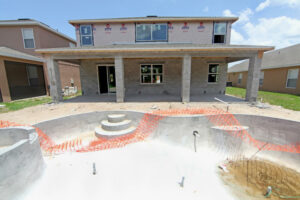
Concrete pools offer unmatched flexibility when it comes to design. They can be built in any size, depth, or shape, and can incorporate features like waterfalls, vanishing edges, beach entries, tanning ledges, and more.
This flexibility allows homeowners to design a pool that fits perfectly into their landscape and aligns with their personal aesthetic preferences. Whether you want a pool in a unique shape, a pool that mimics a natural lagoon, or a sleek, modern design, a concrete pool can make that vision a reality.
Concrete Pools: A Closer Look at Their High Durability
The high durability of concrete pools is another noteworthy advantage. They’re built to withstand extreme weather conditions and the test of time. Unlike other types of pools, they are less susceptible to damage from sharp objects, pets, or rowdy swimmers.
While they may require more maintenance to prevent cracks or surface degradation, their overall structure is typically more robust and resistant to damage.
The Impact of Concrete Pools on Property Value
Concrete pools, especially those that are well-designed and maintained, can significantly enhance the value of a property. They are seen as a luxury addition and can be a significant selling point.
However, potential buyers may also take into account the ongoing maintenance needs of a concrete pool. As such, the impact on property value can depend on the local market and the perspective of potential buyers.
Maintenance Requirements: The Downside of Concrete Pools
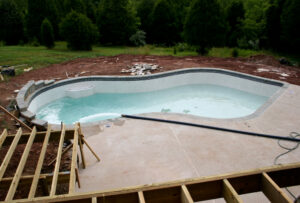
On the downside, concrete pools require more maintenance than other types of pools. This is primarily because their porous surface can encourage the growth of algae, requiring more frequent cleaning and higher amounts of chemicals to keep the water clear and clean.
In addition, regular pH and calcium hardness levels monitoring is necessary as imbalances can degrade the pool surface over time. These maintenance needs can add to the overall cost of owning a concrete pool.
The Time and Cost Factor: Building a Concrete Pool
Building a concrete pool tends to take more time and cost more upfront compared to other types of pools. The construction process involves several stages, including excavation, framework installation, concrete spraying, curing, and finishing, which can take several weeks to months to complete.
Additionally, because they are custom-designed and built, the cost of installing a concrete pool can vary greatly depending on the size, design, and features of the pool.
The Environmental Impact of Concrete Pools: A Noteworthy Concern
Another consideration when choosing a concrete pool is the environmental impact. The process of producing concrete contributes to CO2 emissions, and the frequent water changes needed for concrete pools can lead to higher water usage.
Moreover, the chemicals often used to keep concrete pools clean can have a negative impact on the environment if not properly managed.
Therefore, those seeking a more environmentally-friendly pool option might consider other materials.
The Versatility of Concrete Pools: Material and Finish Options
Concrete pools offer a range of material and finish options to suit a variety of aesthetic preferences. The interior can be finished with white or colored plaster, tile, or a variety of stone finishes for a natural look.
There are also options for aggregate finishes, which combine plaster with pieces of glass, quartz, or other materials to add color and texture. This versatility allows homeowners to create a truly unique and custom pool design.
How Comfort and Safety Play Out in Concrete Pools
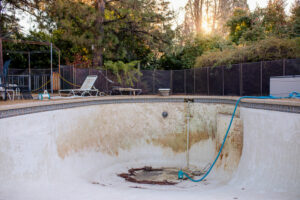
While concrete pools can be designed with safety features like handrails, steps, and shallow ends, their hard surface can be rough on feet and may lead to minor scrapes and injuries if swimmers aren’t careful.
On the other hand, their sturdy construction and the possibility of incorporating safety ledges can make them safer for young children and less confident swimmers. The comfort and safety of a concrete pool can largely depend on its design and how it is used.
Concrete Pools and Their Effect on Water Chemistry
The porous nature of concrete can have an effect on the pool’s water chemistry. Concrete tends to raise the pH of pool water, requiring regular testing and adjustment with chemicals to maintain a balanced pH level.
Also, to prevent calcium from leaching out of the concrete and into the water – which can cause scaling and surface degradation – calcium hardness levels should also be monitored and adjusted as necessary. This additional maintenance can be a significant factor for those considering a concrete pool.
Aesthetic Considerations: The Appeal of Concrete Pools
From an aesthetic perspective, many homeowners appreciate the look of a concrete pool. They can be designed to blend seamlessly into any landscape and can be finished in a variety of ways to complement the surrounding environment.
Whether you want a sleek, contemporary pool or one that creates a natural oasis, a concrete pool can deliver. It’s also possible to incorporate lighting, water features, and other design elements to enhance the pool’s aesthetic appeal.
Weighing the Pros and Cons: Is a Concrete Pool Right for You?
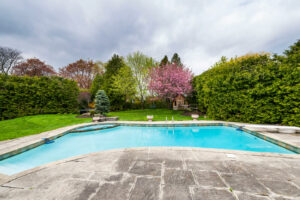
Deciding whether a concrete pool is right for you involves weighing these pros and cons against your budget, timeline, maintenance capacity, and design preferences. While a concrete pool offers longevity, design flexibility, and high durability, it also comes with higher upfront costs, longer construction times, and more maintenance needs.
Considering these factors and consulting with a pool professional can help you make an informed decision about whether a concrete pool is the best choice for your home.
| Pros | Cons |
| Customizability: Concrete pools can be built in any shape or size, allowing for a fully customized design. | Maintenance: Concrete pools require more frequent cleaning and chemical balancing due to their porous surface. |
| Durability: They are highly durable, resistant to damage, and can last for several decades with proper care. | Construction Time and Cost: These pools take longer to build and typically cost more upfront than other pool types. |
| Aesthetic Appeal: Concrete pools offer a range of finish options for a personalized look and can enhance property value. | Environmental Impact: Concrete production, frequent water changes, and higher chemical use can contribute to a larger environmental footprint. |
| Longevity: With regular maintenance, concrete pools can provide many years of use. | Comfort and Safety: The rough surface can be hard on feet and may lead to minor injuries if swimmers aren’t careful. |
In conclusion,
choosing the right pool for your backyard is a significant decision. It’s about balancing the benefits and drawbacks to match your needs and preferences.
Concrete pools, with their high durability and design flexibility, certainly have their advantages. They offer the opportunity to create a truly unique backyard oasis, tailored to your design preferences.
However, they also come with a hefty price tag and require substantial time and effort for installation and maintenance.
When compared with fiberglass and vinyl liner pools, concrete pools can be seen as a long-term investment, given their longevity. But the environmental impact, coupled with their upkeep requirements, are factors worth considering.
Ultimately, the best pool for you depends on a variety of factors including your budget, timeline, maintenance capacity, design aspirations, and environmental considerations.
Take the time to consider these factors, consult with pool professionals, and make an informed decision. After all, a pool can be a wonderful addition to your home, providing a space for relaxation, exercise, and fun family times.

